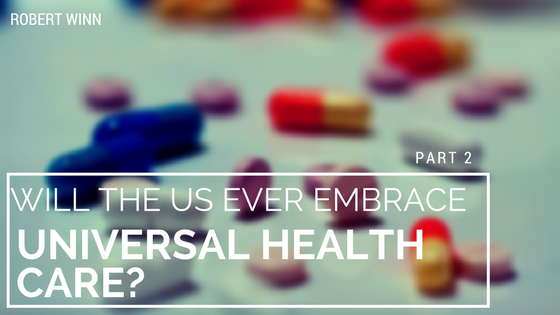This is a continuation of a previous post published on Robert’s blog.
Let’s hop across the pond to France for a moment. Widely accepted as having one of the best healthcare systems in the world, France requires its citizens to enroll in government-funded insurance, but also allows them the option to purchase complementary plans out-of-pocket. All French residents are safely covered and pay reasonable rates for their medical expenses in addition to having more options for insurance plans. So, how can it be that their national spending on healthcare is lower than that in America, where the government doesn’t require enrollment?
Firstly, because universal health care requires total enrollment to be affordable. Without every person paying into the system, the pooled funds aren’t enough to cover necessary costs. Secondly, the American government doesn’t regulate drug prices as stringently as most European countries do. Instead, pharmaceutical companies set the standard; as researchers from Brigham and Women’s Hospital wrote in a 2016 report: “Although prices are often justified by the high cost of drug development, there is no evidence of an association between research and development costs and prices. Rather, prescription drugs are priced in the United States primarily on the basis of what the market will bear.” In simple terms: when large companies set drug prices, they aren’t considering a consumer’s financial hardships. Without regulation, drug prices can skyrocket – just consider the EpiPen, which went up 500% in cost over seven years.
The current state of American healthcare is untenable, and a change needs to be made. I think my position on the benefits of instating universal healthcare is clear – but I don’t have much hope that it will enter into our system. While politicians on both sides of the aisle have made cases for adopting a form of universal care, American culture is steeped in the idea of individual liberty: people want to be able to choose their own healthcare plan. Additional roadblocks are arranged by lobbyists for insurance and pharmaceutical companies who would take a financial hit from a universal system; in 2009 alone, over 4000 lobbyists were hired to influence health care reform.
Now, we find ourselves at an uncomfortable standstill: We need universal care, but the country is utterly divided on whether we should have it, thereby making its implementation nearly impossible. As a doctor and civilian, I worry for us. Without total reform towards a universal system, I can only imagine that healthcare prices will rise, and that more Americans will become just as jaded as that woman waiting by the pharmacy counter.


